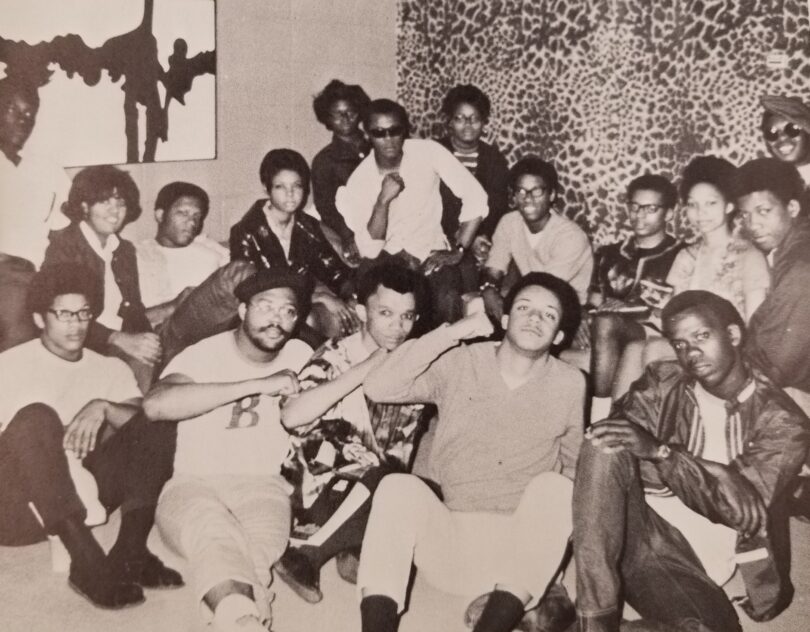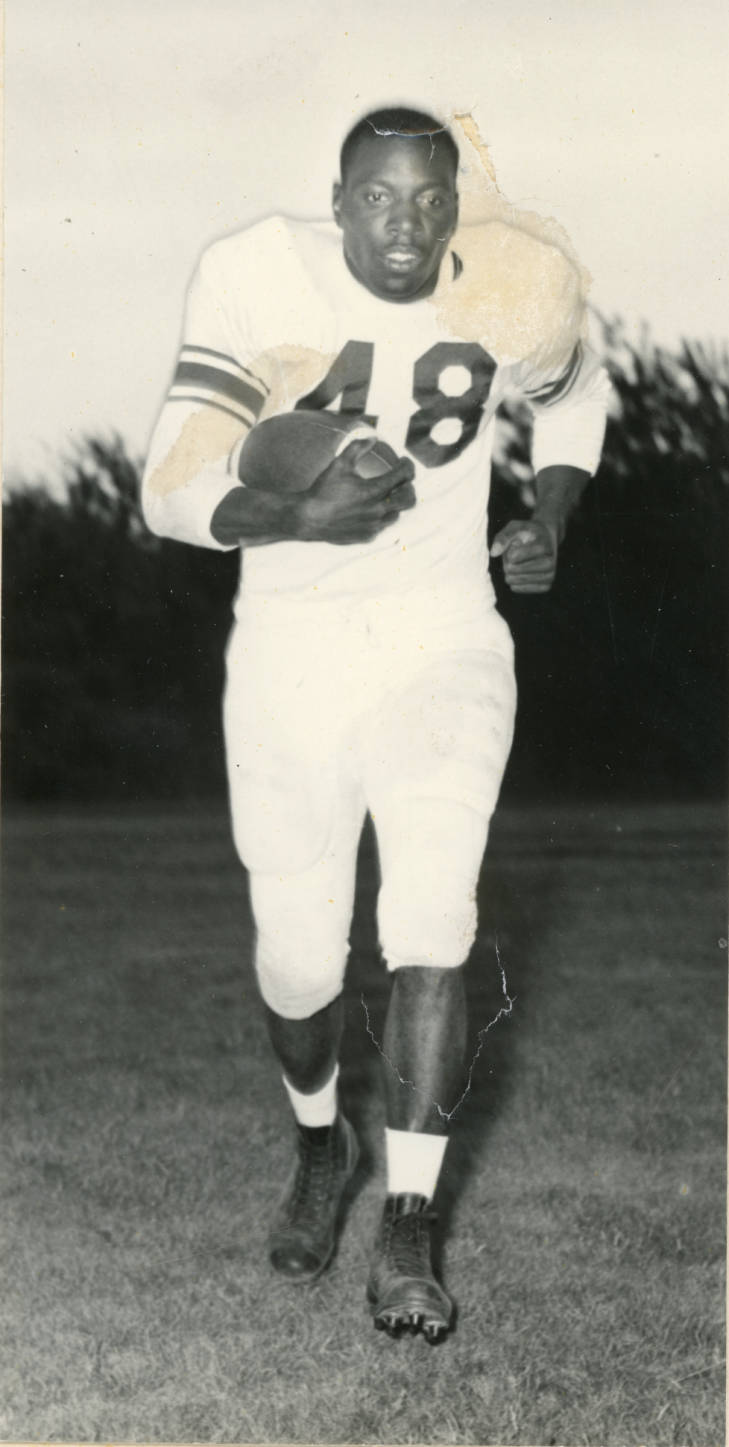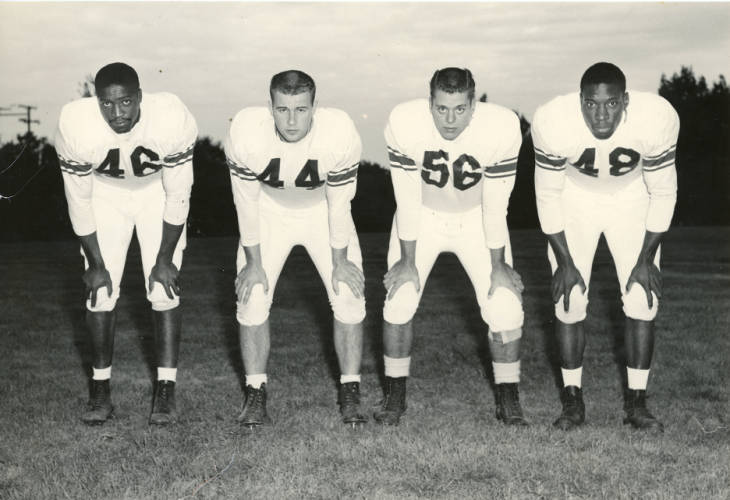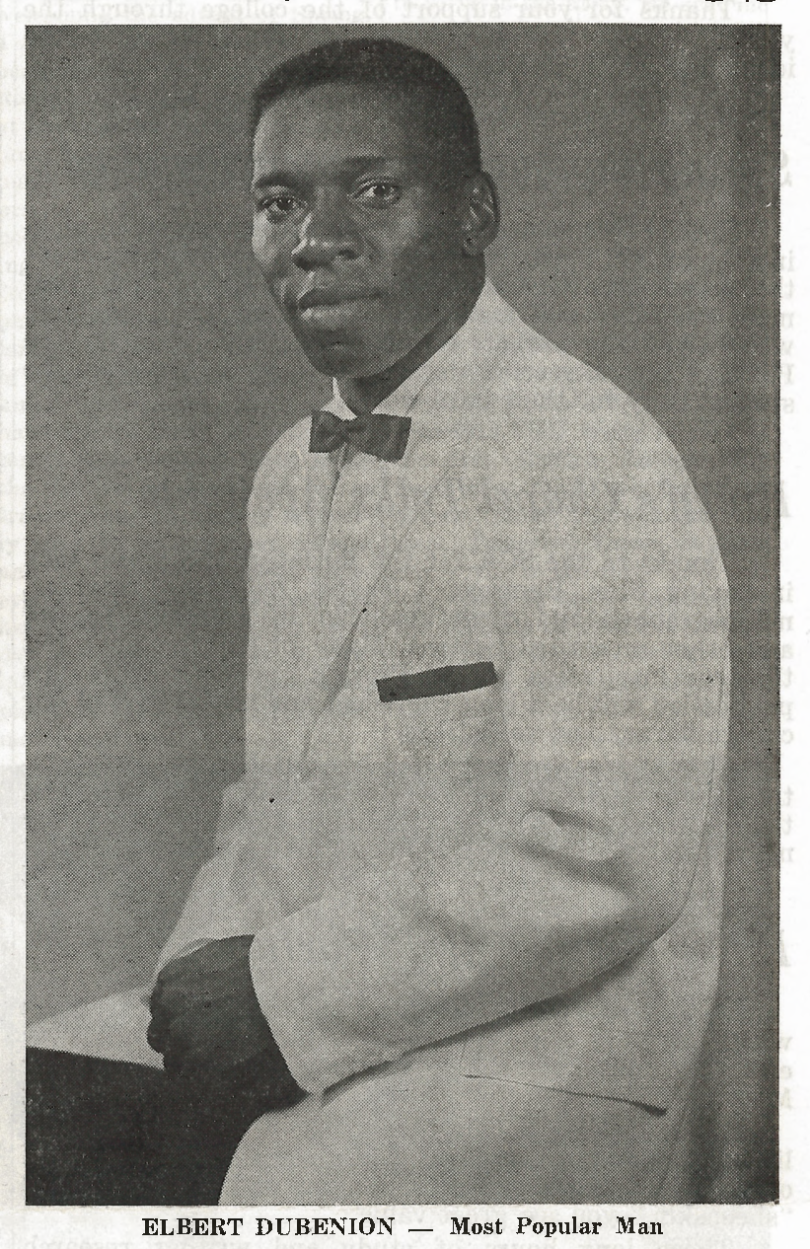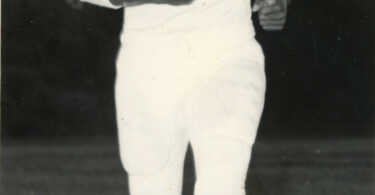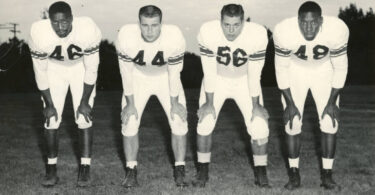Black History Month has come to a close but reflection on history doesn’t have to end, even as new chapters continue to be written.
The path that leads to a yet-to-be finished Black Lives Matter mural on campus involves a scattered trail that winds back to when Bluffton University was known as Central Mennonite College and then Bluffton College. A lot can be learned when scouring through the university’s archives, yearbooks and helpful staff.
What follows is not a comprehensive history. Rather its goal is to provide a snapshot of some of the more prominent individuals with information found both with the help of Interim Library Director Carrie Phillips and in university archives and yearbooks.
John Perry Sloan

The 1907 class of Central Mennonite College, L to R: Lillian Amstutz Lugibihl, Cathryn Mitchell Goble, John Sloan, Selma Suter Sommer, Cyrus Schumacher, Lillian Egly Latchaw, Homer Suter, Nellie Eaton Sarrick, William Albrecht, Caroline Burkholder, Ida Basinger. Photo courtesy of Bluffton University Archives.
John Perry Sloan was the first Black student admitted into Central Mennonite College in 1904. Tensions were high following events that
happened at the law department at Northern Ohio Normal School (now Ohio Northern University) in the fall of 1904. Student petitions and strikes pressed for the removal of a Black student G. W. Koontz, who grew up near Ada, Ohio. Noah Hirschy, the first president of CMC, reached out to Sloan to welcome him as a student at CMC.
Sloan studied a range of subjects that included Latin, German and chemistry. He was also known as a valuable player for the college’s “first football team of substance” as Phillips phrased it in an unpublished chapter about Sloan that she wrote for a book.
After Sloan graduated from CMC in 1908, he went on to study at the University of Michigan where he attempted degrees in engineering, dentistry, and literature, science and the arts. Sloan became an avid football fan for the University of Michigan’s team the Wolverines for whom he became a successful salesman of merchandise, concessions and traveling to their away games no matter the distance.
he attempted degrees in engineering, dentistry, and literature, science and the arts. Sloan became an avid football fan for the University of Michigan’s team the Wolverines for whom he became a successful salesman of merchandise, concessions and traveling to their away games no matter the distance.
Elbert “Dobe” Dubenion
Elbert Dubenion graduated in 1959 when the university was known as Bluffton College and went on to play professional football with the Buffalo Bills.
According to the ’59 yearbook, Dubenion was a member of the football, basketball, track and Varsity B teams all four years he was a student. Upon his graduation, he was ranked third among the nation’s backs in rushing. As a fleet left halfback, he ran a Bluffton career total of 1290 yards on 151 carries, making for nearly a 9-yard per carry average.
Fondly known by his fellow Bluffton students as “Dobe,” The Witmarsum wrote about Dubenion in the Oct. 31, 1958 issue.
“Fans will long remember the indescribable antics of left halfback Dubenion speeding past a bewildered defense or climbing a pass defender to snare an aerial marked for him. To date ‘Dobe’ has tallied 49 touchdowns in his college career.”
After graduating from Bluffton, Dubenion eventually signed with the Buffalo Bills in the American Football League and played for the team from 1960 to 1968. Coach Ken Mast gave him a special honor by having his jersey and number 44 retired—a number that is still not in use today.
As is recorded in the Buffalo Sports Hall of Fame, in his nine seasons with the Buffalo Bills, Dubenion totaled 296 receptions for 5,424 yards and 36 TDs for a career average of 18.3 yards per catch. It was also noted that he set virtually every receiving record during that period of football when the Bills were a top opponent in the AFL.
Black Student Union
The Black Student Union of Bluffton College was formed in the 1969-70 school year. According to that year’s yearbook, the organization
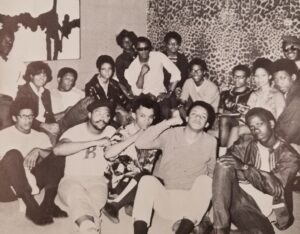
The students involved in BSU the first year it was formed. Photo courtesy of Bluffton University Archives.
formed “to create and stimulate a greater interest and development among Black students on campus.” It also elaborated on how the BSU participated in the recruitment of more Black students and sponsored a BSU weekend that allowed the entire campus to learn more about Black culture.
The BSU addressed several issues regarding representation on campus to the president and the board of trustees. Within many of the exchanges the BSU had with administrative staff soon after the organization formed, they listed five areas of improvement they wanted to see: acquiring a cultural house, hiring of Black professors, increased enrollment of Black students, hiring of a full-time Black admissions counselor and the hiring of a Black counselor. There reached a point where students boycotted classes until their demands were met, which started the process of negotiations.
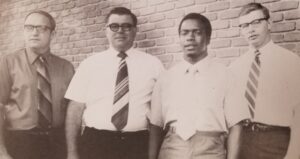
(L to R) Head Coach Roger Bixel, Jim Siewart, Nate Fields, Ron Bash. Photo courtesy of Bluffton University Archives.
A junior by the name of Nathaniel Fields was the Chairman of the BSU during its first year and was hired as program director when the Afro-American Cultural Center was created. He can also be seen in the ’72 yearbook as one of the football coaches. In January of 2019, Fields returned to Bluffton to talk at the annual Martin Luther King Jr. Forum and he reflected on Dr. King Jr.’s blueprint speech that was delivered in ‘67, when Fields was a student at Bluffton.
Archie Perry

Assistant Professor of Education, Archie Perry. Photo courtesy of Bluffton University Archives.
Archie Perry was the assistant professor of education in 1969-72 and became the first Black professor at Bluffton College. He also stood as the advisor for the new BSU in his first year teaching at the college. There is not a lot of information regarding Perry other than that he left the college in 1972 because he received another job offer that he took.
In an issue of The Witmarsum released the semester prior to Perry’s hiring, the reporter (who remains unknown) questions why the college did not have any Black professors. At the end of the column, the reporter left questions to the administration.
“The Witmarsum would like to ask the Bluffton College administration if the channels that they went through to hire their faculty members were by their nature discriminatory or designed to reach the white segment of our population? If so, is the administration aware of this? If so, are they opening up new channels, and at what pace and feelings are they opening up these channels so as to obtain applications from a Black man or woman for teaching positions here?”
Dr. Martin Luther King Sr.
April 12, 1978, Dr. Martin Luther King Sr. visited Bluffton College to speak at a forum during Black Emphasis Week. His message, which he considered a sermon within itself, was titled Catalyst: The Greatest Love.
“I’m not bitter. I carry no ill-will against any man. I refuse to stoop low enough to hate anyone. Don’t you either. As a result of hate I don’t have two sons or a wife. I am everyone’s brother. I’ve got to go on with my job, being every man’s brother. I love every one of you. And I hope every one of you love me. If you spread this message, we can have a beautiful world—which we do not have now.”

Members of the Black Student Union visit with Dr. Martin Luther King Sr. in the Marbeck Center Commons. King spoke on campus in a forum on April 12, 1978, as part of Black Emphasis Week.
It was noted in that week’s issue of The Witmarsum that he spoke about the totality of humanity and the communion of souls, ideas, hearts and love under the wisdom of God. Dr. King Sr. visited with the BSU who planned the week’s events as well.

